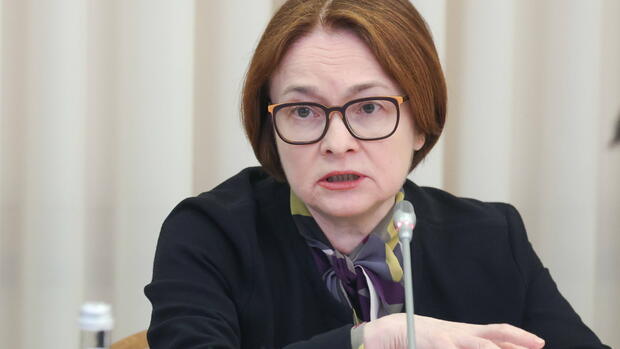Vilnius The central bank had kept the key interest rate stable for months, now Russia’s central bank chief Elvira Nabiullina is making a U-turn: For the first time since the emergency hike after Russia’s invasion of Ukraine, the central bank is raising the interest rate again, by a full point to 8.5 percent. Most analysts had only expected an increase to eight percent.
The fact that the central bank is now taking this step is largely due to the fall in the currency – and it is likely to remain under pressure in the long term. Commerzbank experts expect the ruble to depreciate further by up to a third by the end of 2024, while inflation expectations are now at their highest level in months. The central bank is therefore considering a further hike in September.
Central bank governor Nabiullina has repeatedly been praised for her wartime monetary policy maneuvers. A few days after Russia invaded Ukraine in February last year and the West decided on the first financial sanctions, the central bank raised the key interest rate from 9.5 to 20 percent in a historic decision to prevent the ruble from falling. At the end of April, Nabiullina then began gradually lowering the key interest rate, which has remained unchanged at 7.5 percent since mid-September.
The head of the central bank is now ending this passive phase in order to combat the currency collapse and its side effects. Over the past year, the ruble has depreciated more than 35 percent, largely due to Russia’s exports falling while imports have recovered significantly. Measured against the euro, the ruble has lost more than half of its value since peaking last September.
Nevertheless, the Russian war economy should not run out of steam as a result. And thanks to the low level of unemployment, displeasure among the general public should also be contained. “Putin still has everything he needs to wage war,” says Janis Kluge, economist and Russia expert at the Berlin Science and Politics Foundation.
Other economists also see no signs of the Russian economy collapsing anytime soon. However, some of the framework conditions that central bank governor Nabiullina has to work with are becoming increasingly difficult.
Inflationary pressures could intensify
“The central bank’s biggest concern is inflation,” says Russian political economist Alexandra Prokopenko, who is currently doing research at the Berlin Center for East European and International Studies. Experts speak of “imported inflation”, fueled by the weak ruble and high government spending.
Political factors also play a role: the uprising of the Wagner mercenaries at the end of June put the Russian currency under additional pressure. Out of uncertainty, Russians withdrew a lot of money at once and transferred portions of their assets from ruble accounts to foreign exchange accounts. Shortly thereafter, one euro cost 100 rubles again for the first time since March 2022. The bad values that resulted from this have not yet been reflected in inflation. This effect will only occur with a time lag, explains Prokopenko.
But rising salaries, which strengthen domestic demand, also contribute to inflation, as Prokopenko explains. “People have started buying various long-term goods, all of which are driving up inflation.” Traders and retailers are preparing for price hikes in a wide range of areas, according to Russian newspapers.
In June, inflation in Russia was 3.3 percent, the central bank’s self-declared inflation target is four percent. However, there is concern about much higher values: Inflation expectations for the next twelve months climbed to more than eleven percent in Russia in July, which is the strongest increase in almost a year.
>> Read here: How Russian diesel gets to Europe despite the embargo
Through parallel imports, Russia can compensate for the drop in imports to a considerable extent. However, the goods imported in parallel are also more expensive, as Kluge explains. A labor shortage also contributes to inflation. When unemployment is low, the demand for goods and services increases, which can lead to price increases. In May unemployment in Russia was 3.2 percent, a year earlier it was 3.9 percent.
Experts do not expect massive dissatisfaction
However, the SWP expert does not believe that rising inflation will lead to unrest among the population. “Rising prices always cause resentment, but in my view it is very unrealistic that economic dissatisfaction will lead to a revolt – more likely one day the ever-increasing number of soldiers killed,” he says. For the population, the real disposable income is decisive, not the higher price level.
The sanctions would certainly have a “negative impact on Russia’s ability to wage war,” says Kluge, “also because Russia will be left behind technologically in the long term.” In the next one to two years it is unlikely that economic turmoil in Russia will lead to the end of the war – unless external factors change the framework conditions, “for example, if the price of oil falls sharply”.
>> Read here: Elwira Nabiullina – This woman is supposed to save Russia from economic collapse
Political economist Prokopenko also believes that inflation is currently “not particularly painful” for the population – and certainly not painful enough for uprisings to break out.
Of course, raising interest rates comes at a price: the more expensive it is for banks and companies to borrow money, the less investment is made, which has a negative impact on growth. However, Prokopenko sees this as a necessary “cooling down” for the Russian economy.
“The Russian economy is surprisingly overheated,” says the expert. “The rate hike is needed to cool this activity.” It was essentially speculative growth driven by government demand. “Government demand is driven by military needs,” emphasizes the researcher, adding that this is not sustainable.
She sees no contradiction in the fact that the central bank compensates for the effects of politically controlled processes. Sometimes it’s just “just hard to explain that the Russian central bank is independent of the government”.
More: The ruble falls and falls – now Russia is threatened with inflation
